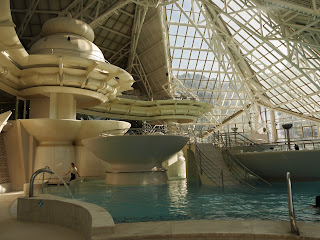Bone tools - awls, needles - began to be widely used. A device was made from bone and horn, which made it possible to increase the range of a spear - a spear thrower. Bone products were decorated with carvings - ornaments or images of animals, which, it was believed, gave them a special power.
In this era, onions appeared in some places. In total, about 150 types of stone and 20 types of bone tools of the Late Old Stone Age are known.
It was the time of the last glaciation. Herds of mammoths, woolly rhinos, and bison grazed where the cities of France, Spain, and southern Russia are now located. Following the herds of animals moved communities consisting of small families - father, mother, children. Hunting for animals provided not only meat, but also material for making tools and ornaments. Our ancestors were especially fond of necklaces made of animal teeth. They were also engaged in catching fish, which was abundant in rivers and lakes.
People now lived not only in caves or grottoes, but also in parking lots, in solid dwellings. The material for the buildings, probably, was often wood and skins, but the ruins of semi-dugouts made of mammoth bones have come down to us. Huge bones and tusks were used to build the frame of the dwelling, which was then covered with skins, branches, and partially covered with earth. The ruins of such large dwellings, which belonged to several families, were found during excavations near Voronezh and in Ukraine.
The way of life of people of the Stone Age, the level of their development partly resembles some aspects of the life of peoples who in the recent past, before the arrival of Europeans, lived in Australia, certain regions of South Asia, South America and Africa. Of course, it is impossible to directly compare them: over the past thousands of years, even people as cut off from civilization as the natives of Australia have accumulated a lot of observational experience, their thinking abilities have developed, and their perception of the world has expanded. And yet, the life of these tribes and peoples allows us to understand to some extent how people lived 30-20 thousand years ago.
The old city of Cuenca was largely built without any logic, moulding the buildings one after another, and the result is one of 'hanging favelas' that seem to be harmonious; a similar feat to that of the Ponte Vecchio in Florence but on rocks instead of water. Living in these houses seems impossible, with a 50 metre drop from the windows! But nevertheless people will live here as long as they can hang their clothes from the window!
None of Spains cities give the same feeling of the Middle Ages as Cuenca. It's authentic but without a multitude of tourists that think they know better than the guides about where to go and to take pictures. Cuenca is not so much of a spectacle in the way that Toledo is, it's real life, more sincere, and therein lies its charm: in the narrow winding streets that lead to the top of the city, in the monasteries hidden in the folds of the mountains, in the ruins of an Arab fortress, in the cliffs, where you can see the city and the valley as if in the palm of your hand...
